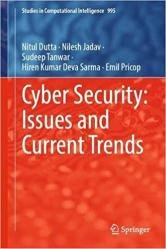Cyber Security: Issues and Current Trends
- Добавил: literator
- Дата: 1-11-2021, 15:57
- Комментариев: 0
 Название: Cyber Security: Issues and Current Trends
Название: Cyber Security: Issues and Current TrendsАвтор: Nitul Dutta, Nilesh Jadav, Sudeep Tanwar
Издательство: Springer
Год: 2022
Страниц: 183
Язык: английский
Формат: pdf (true), epub
Размер: 51.8 MB
This book presents various areas related to cybersecurity. Different techniques and tools used by cyberattackers to exploit a system are thoroughly discussed and analyzed in their respective chapters. The content of the book provides an intuition of various issues and challenges of cybersecurity that can help readers to understand and have awareness about it. It starts with a very basic introduction of security, its varied domains, and its implications in any working organization; moreover, it will talk about the risk factor of various attacks and threats. The concept of privacy and anonymity has been taken into consideration in consecutive chapters. Various topics including, The Onion Router (TOR) and other anonymous services, are precisely discussed with a practical approach. Further, chapters to learn the importance of preventive measures such as intrusion detection system (IDS) are also covered. Due to the existence of severe cyberattacks, digital forensics is a must for investigating the crime and to take precautionary measures for the future occurrence of such attacks. A detailed description of cyberinvestigation is covered in a chapter to get readers acquainted with the need and demands. This chapter deals with evidence collection from the victim's device and the system that has importance in the context of an investigation. Content covered in all chapters is foremost and reported in the current trends in several journals and cybertalks.
Chapter 8 has a prominent practical character. We tried to describe creating a cybersecurity laboratory based on virtual machines, honeypots, and other software tools and libraries. Physical machines are prone to several attacks via malware and network intrusions. It is easy to attack such machines as they have many attack vectors in the form of software and hardware. Certainly, less effort is required for an attacker to attack the CPU or any software residing in the operating system (OS) compared to the virtual machine. “Virtuality” is defined as something that possesses an attribute without sharing its physical form. This definition encourages the IT field to create virtual machines, which are somehow challenging for any cybercriminal to attack. Virtual machines produce a virtual environment with a virtual computer with their CPU, network interface, memory, and storage over any physical hardware system. It refers to the technology that makes it possible for any hardware component to run on a system using virtual software regardless of their physical forms, such as virtual machines, VMware, and VirtualBox.
A system can be simulated using simulation software, where the system’s internal logic and components will also be simulated. The simulation gives the flexibility to run programs that are not possible to run directly on that specific system but can run using simulation. Mac—Xcode and MATLAB–Simulink are the best examples of simulations to test program code design. Mobile applications should be run on mobile. However, it must be tested multiple times before handing it over to the client. It is a very tidy process if we take the application from the desktop and put it into mobile multiple times for testing. Hence, Mac-Xcode is used to test the design of any mobile application on desktop computers. Similarly, MATLAB–Simulink provides a simulated environment to model, design, and analyze multi-domain dynamic systems. In contrast to simulation, emulation runs the hardware or software components on a system, but not their internal logic. Android Emulator is the best example of emulation to test and design code for any Android application.
The proposed book is helpful for any reader who is using a computer or any such electronic gadget in their daily routine. The content of the book is prepared to work as a resource to any undergraduate and graduate-level student to get aware about the concept of cybersecurity, various cyberattacks, and threats in the security. In addition to that, it aimed at assisting researchers and developers to build a strong foundation for security provisioning in any newer technology which they are developing.
Contents:
1. Introduction to Cybersecurity
2. Being Hidden and Anonymous
3. TOR—The Onion Router
4. DarkNet and Hidden Services
5. Introduction to Digital Forensics
6. Intrusion Detection Systems Fundamentals
7. Introduction to Malware Analysis
8. Design of a Virtual Cybersecurity Lab
9. Importance of Cyberlaw
Скачать Cyber Security: Issues and Current Trends
[related-news] [/related-news]
Внимание
Уважаемый посетитель, Вы зашли на сайт как незарегистрированный пользователь.
Мы рекомендуем Вам зарегистрироваться либо войти на сайт под своим именем.
Уважаемый посетитель, Вы зашли на сайт как незарегистрированный пользователь.
Мы рекомендуем Вам зарегистрироваться либо войти на сайт под своим именем.
